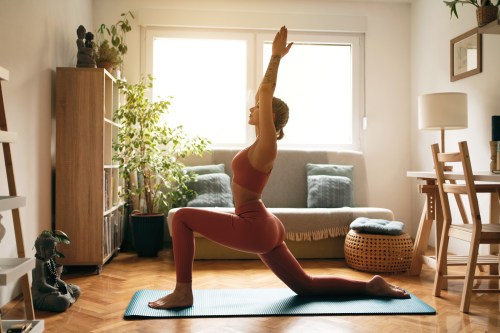Our editors independently select these products. Making a purchase through our links may earn Well+Good a commission
You’ve been dreaming about bed all day, you’ve been telling your co-workers, “I’m so exhausted,” like dying to nest up and get your beauty sleep. But if you hit the mattress and get to snoozing immediately, that terminology might not be accurate. There’s a big difference between feeling exhausted and fatigued vs feeling tired, and it’s important to know the difference.
Experts in This Article
women’s health physician and author of The Adrenal Thyroid Revolution
clinical psychologist, sleep specialist, author of The Women’s Guide To Overcoming Insomnia, and Director of Sleep Health at Sleepopolis
“Fatigue and sleepiness are a bit different and important to make a difference between them,” says Shelby Harris, PsyD, sleep-health expert and author of The Women’s Guide to Overcoming Insomnia. “You can be both, but we often confuse the terms.”
Interesting. So how to tell if you’re in the lure of one or the other?
1. Sleepiness is more about being tired and less about overall energy
If you’re just feeling sleepy, nap time will be the solution to all your problems: when you’re sleepy, simply and purely sleepy, your body is ready and willing to seek out the rest you need.
“Sleepiness is the actual act of falling asleep, napping and dozing at times when you’re quiet, sedentary, and don’t really always intend to doze,” Dr. Harris says.
But napping won’t come so easily if you’re actually feeling fatigued, which means your body, mind, and soul are trying to run on 8 percent battery without ever going into sleep mode.
“Fatigue is that feeling of dragging a ton of bricks behind you, having no energy, no gas in your tank,” says Dr. Harris. “However, when you’re able to try and nap, sleep just doesn’t come even though you want it to.”
2. Fatigue and insomnia tend to skip together hand-in-hand
There’s a vicious cycle that comes with more chronic fatigue: in essence, you’re so tired you can’t sleep. And because you can’t sleep, you get stuck in this holding pattern of total exhaustion.
“Many people with insomnia but no other medical or psychiatric issues often have fatigue, but not sleepiness,” Dr. Harris. “They try to sleep, but it just won’t come”
3. Sleepiness is usually about specific external or internal issues
Often you know why you’re feeling a bit sleepy: you stayed up to watch just one more episode of that show, or you woke up early to make a gym class, cutting into your eight hours of rest. But if you find yourself feeling occasionally drowsy despite clocking in eight hours regularly, Dr. Harris suggests talking to your doctor about issues that could be impacting your sleep quality. Just a few potential suspects might be sleep apnea, circadian rhythm issues, and narcolepsy.
4. Fatigue may be a little bit more difficult to pinpoint
Feelings of prolonged energy drain might need a bit of trial and error before you really know what’s going on. Dr. Harris suggests that you start by taking stock of your sleep hygiene. You can do this by practicing stress-reducing habits, limiting caffeine, maintaining a regular bed and wake time, keeping off screens for an hour before bed, limiting heavy meals and liquids within three hours before bed.
“Also work to increase physical activity by exercising, going for walks or doing something to move around,” says Dr. Harris. “Physical exercise helps improve sleep and reduce fatigue. The key is to be consistent, say, at least two weeks. If after two weeks of making changes and sticking with them you haven’t seen any impact on your energy levels, then it’s time to talk with your doctor.”
If you’re thinking that your age may be to blame for feeling more fatigued than before, know that’s likely not the case. While the factors surrounding your age—more responsibilities, less consistent lifestyle habits, etc.—contribute to low energy levels in women as they age, your age itself is not a cause on its own. “Often, people do feel more tired as they get older, but it’s because they’re not getting enough sleep, eating right, or exercising regularly, not because they’re older,” Aviva Romm, MD, women’s health physician and author of The Adrenal Thyroid Revolution, previously told Well+Good.
If you still feel tired beyond belief even after adjusting your habits, your doctor should be your next stop for further help. “Exhaustion is more of a general idea that’s extreme and longer-term in nature,” says Dr. Harris. “If you’ve made the above-mentioned changes—working to reduce stress and improve sleep quality and quantity—and are still feeling worn out, struggling to find energy to get through the day, and continue the activities you usually do, consult with your physician regarding possible causes.”
—reviewed by Angela Holliday-Bell, MD
Suffering from burnout-fueled insomnia? A functional medicine doc has a few ideas for you. And if you’re feeling hungry, here’s a nutritionists top foods for better sleep.
Sign Up for Our Daily Newsletter
Get all the latest in wellness, trends, food, fitness, beauty, and more delivered right to your inbox.
Got it, you've been added to our email list.










